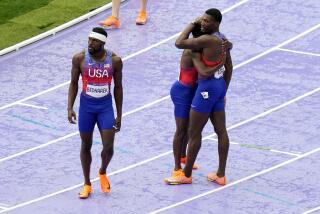Amid Confusion, Defiance Reigns : Reaction: Whether they support Reynolds or not, athletes are increasingly angry at the powers that be.
- Share via
NEW ORLEANS — Scratch a controversy and underneath you will find a T-shirt slogan waiting to be marketed.
Runner Sandra Farmer provided the appropriate one Saturday, more a day for lawyers than athletes at the U.S. Olympic trials.
“Ban us,
Ban us all.
All for one,
One for all.”
Farmer’s defiant tone did not carry the day, but embodied in it was a defiance felt by many here. Rarely was a disparate group more unified in its desire to fight the powers that control them.
Such civil disobedience was shrewdly timed, as the powers that control were so out of control Saturday.
The U.S. Supreme Court allowed suspended runner Butch Reynolds to compete, but he didn’t. Because none of the 32 finest American 400-meter runners ran. Because the four heats were rescheduled three times, finally to begin today at 10 a.m. PDT.
Maybe.
Confusion ruled, soon after the Supreme Court did.
Athletes preparing to run the first heat of the 400 were notified 10 minutes before the race that there wouldn’t be a race. Officials from The Athletics Congress, which governs track and field in the United States, hastily called a meeting of the athletes to inform them of the threatened ban by the International Amateur Athletic Federation, the sport’s international governing body.
TAC told the athletes that anyone who ran against Reynolds might be subject to a ban, and then left the athletes to discuss the issue. People’s Court turned into Family Feud.
“That was a hell raiser!” said Nelson Hall, father and coach to Darnell Hall of Detroit. “Butch said he didn’t want to jeopardize the (eligibility) of the others. Then he went on a rampage, yelling.”
According to those present at the meeting, held in the sweltering Clerk of Course’s tent near the track, Reynolds appealed for solidarity among the runners and asked for their support in his effort to run. But the runners knew that even though various court challenges have brought Reynolds to the Olympic trials, no court can allow him to run at the Olympics next month in Barcelona.
Reynolds, the world record-holder, was challenged by Olympic bronze medalist Danny Everett.
“Why are you doing this, if you can’t even run in the Olympics?” he asked. “You’re just being selfish!”
Reynolds shouted back at Everett, and the “discussion” deteriorated. TAC officials intervened and asked the athletes how many wanted to run Saturday. Few said they did, many said they didn’t and many more said they were confused.
Seeing no other immediate course, TAC rescheduled the race for 3 p.m. PDT.
Reynolds left the meeting awash in a sea of New Orleans police officers, military police and television reporters brandishing microphones.
Immediately after its announcement to reschedule, TAC officials huddled to discuss options and liability. The assembled international media checked watches and dived for phones.
TAC met again with the athletes and rescheduled the race for 5 p.m. PDT, two hours after the meet was over.
But would any athlete line up next to Reynolds, who was placed in the fourth heat, Lane 7? Everett, Reynolds’ verbal sparring partner, was put in the same heat, in Lane 1.
Steve Lewis, 1988 Olympic champion, had made up his mind not to run against Reynolds, no matter the time or day.
“I’m disappointed,” Lewis said, drained after a day of on-again, off-again non-racing. “It’s horrendous. I blame Butch. I have my gold medal, but I feel for some of these younger athletes.”
More informal meetings between agents and coaches materialized. Defiance and anger prevailed, but a common voice was beginning to be heard. It seemed to be saying: “We will not run against Butch.”
TAC seemed to hear that voice and met in one final, furious knot of officials. The official word, Part 3, was that the race would be run today at 10 a.m. PDT, two hours before the quarterfinal was scheduled. Both races would be run in one day.
Most athletes and coaches had already drifted away by the time of the announcement. Few were left to hear it. Others, because of the confusion of that prevailed throughout the day, didn’t know whether to believe the new schedule.
As a blazing sun set on an empty stadium Saturday, Everett walked onto the track and blinked as he surveyed the scene.
“Where is everyone?” he said. “Aren’t we supposed to run?”
Stay tuned.
More to Read
Go beyond the scoreboard
Get the latest on L.A.'s teams in the daily Sports Report newsletter.
You may occasionally receive promotional content from the Los Angeles Times.







